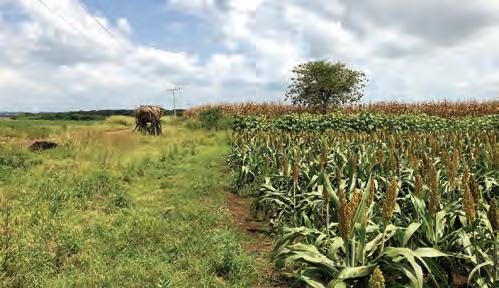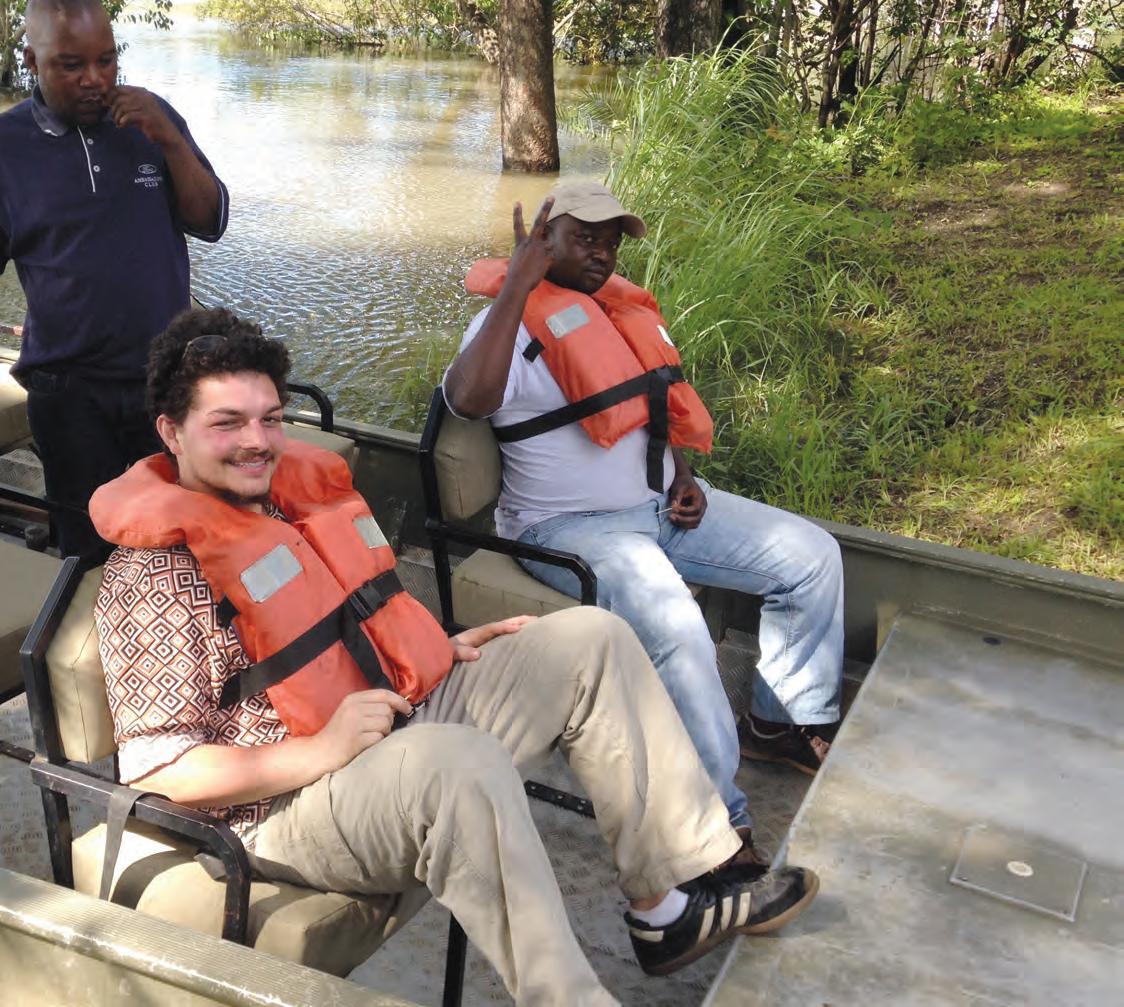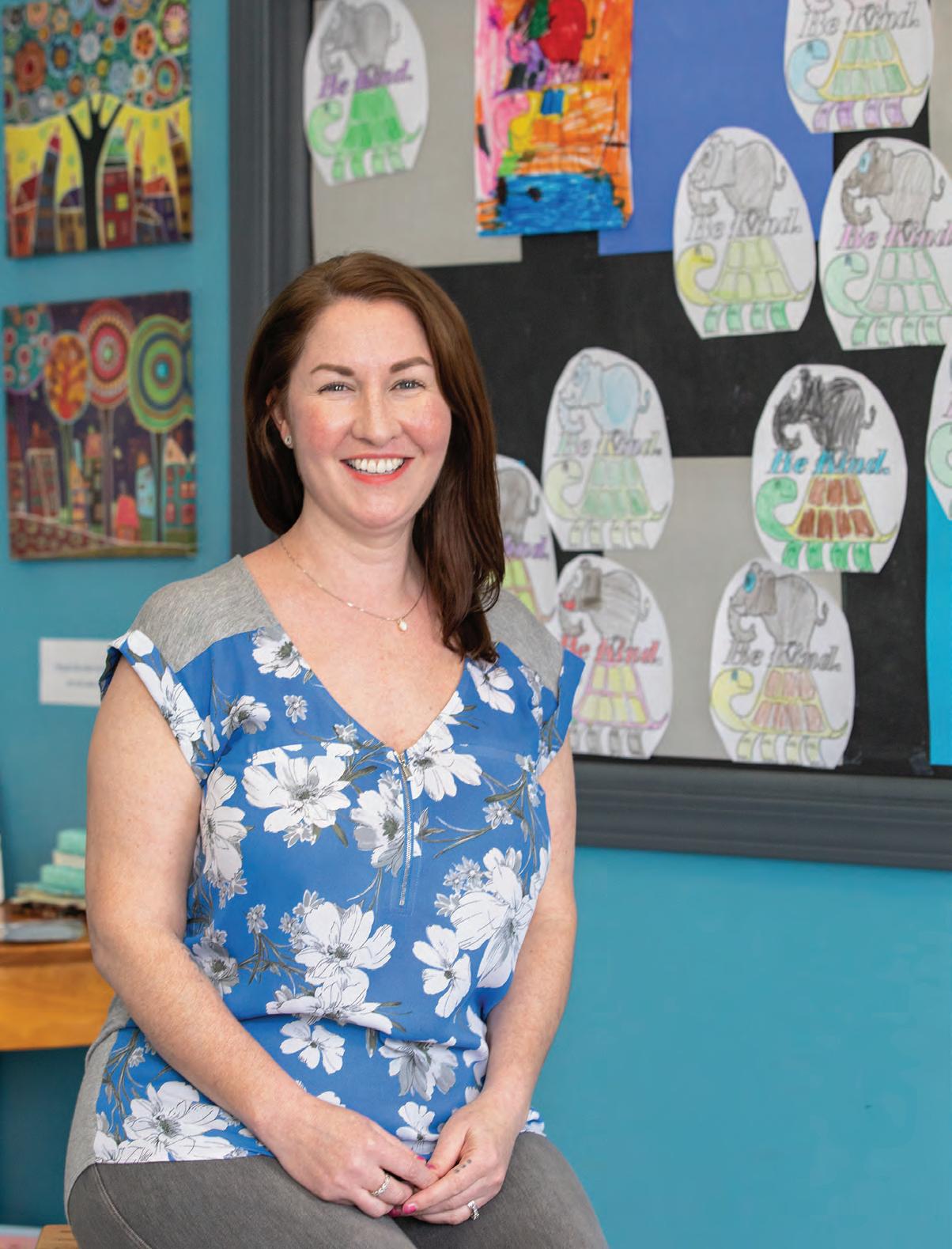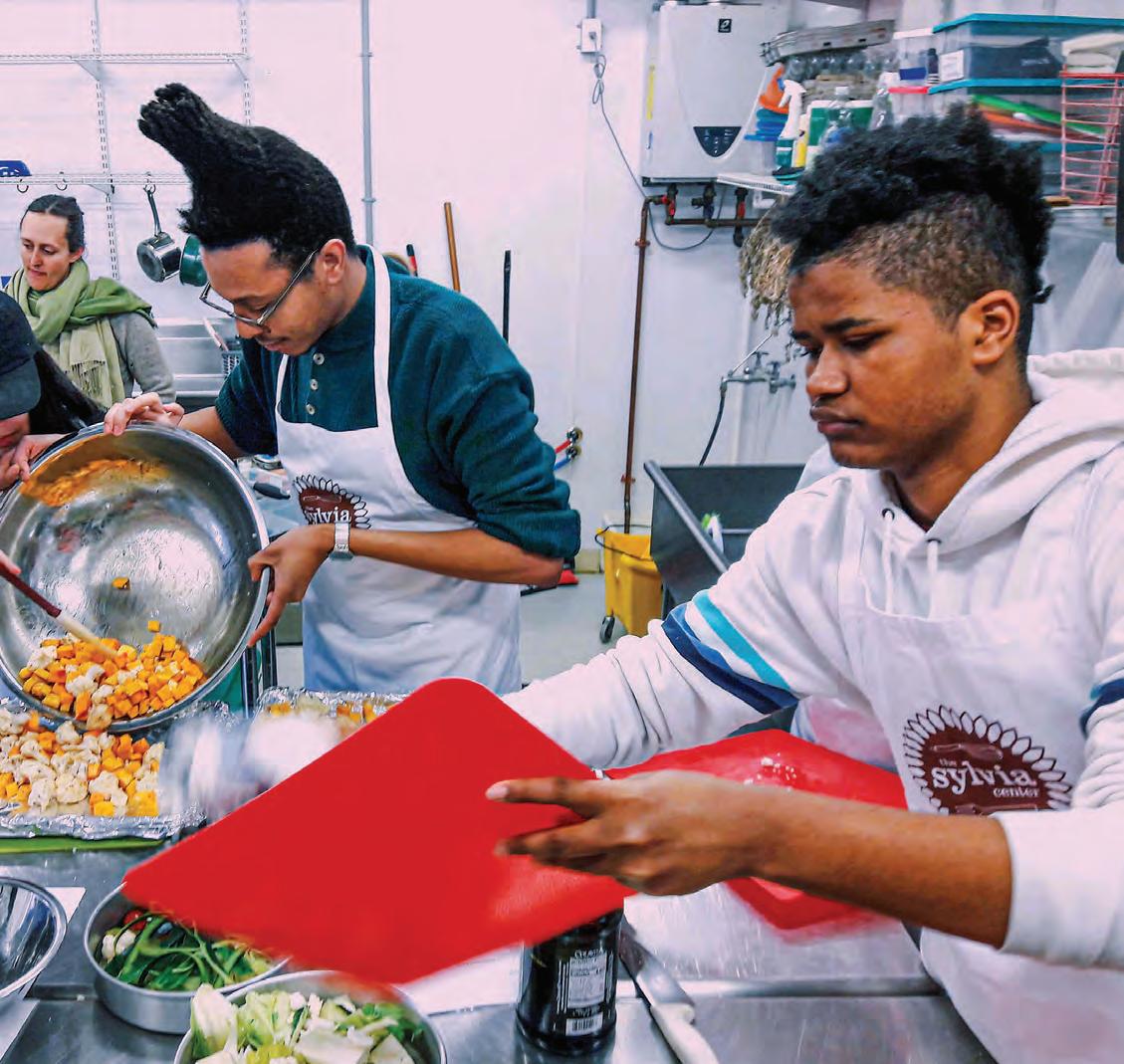
17 minute read
GAME CHANGERS
BY KIMBERLY WEINBERG
It is not an easy thing to create an opportunity for someone where none existed before.
It takes confidence and courage to overcome obstacles.
There are large systems full of inertia that seem too big to overcome. There are personal challenges to face, too, like burnout, fatigue, skepticism and selfdoubt. Once created, each opportunity has to be nurtured and guarded.
The challenges are great, but six PittBradford alumni are investing in the future to do what they can to create ways for others to grow and succeed. Their daily work creates opportunities for others to give, grow, vote, work and pursue justice.
Steven Bennett ’96-’98 U.S. Department of State
Steven Bennett has worked at the U.S. Department of State for nine years, but the Eldred, Pa., native always longed to see the world and serve his country. He’s been doing those things since he graduated from the Pittsburgh campus in 2000 as an accountant. Pitt-Bradford did not yet offer accounting as a major, but he got his start with Betsy Matz, who taught accounting at the Bradford campus for many years, then transferred to the Pittsburgh campus.
He met his wife, a foreign service officer, while stationed in Frankfurt, Germany, with the U.S. Agency for International Development, an agency that distributes aid and expertise to advance development abroad.
Together, they served in Frankfurt and Dakar, Senegal, before Bennett also joined the U.S. State Department. At first, he was a financial manager for the department’s embassies in Moscow and Sri Lanka. Now the couple is stationed in Washington, D.C., where he oversees budgets and resources for European embassies.
“I’m a problem solver,” he says. “I have a lot of face time with people who come to me and want to do something, and I try to figure out how they can do it.”
While not directly involved with the department’s frontline consular or diplomatic work, Bennett’s role is an important one.
“We have all of these people who have all these amazing skills,” he said. “I can provide the resources for the people who are really good at the diplomatic or consular aspect and make sure they can focus on their jobs.”
That can involve having to figure out how to provide legal support for Americans abroad or help return Americans to the United States during a crisis such as the COVID-19 pandemic.
One aspect of the State Department that Bennett is active in is opening foreign countries to American business.
“It’s benefiting American jobs and bringing money back to the United States,” he said. U.S. embassies also work closely with other nations’ governments to advance workers’ rights, particularly in the developing world, by drafting and finding support for international trade and worker treaties.
“We’re looking for mutually beneficial relationships,” he said.
“When I get up every morning, even though I’m counting dollars, I’m advancing U.S. government policy wherever I’m working, every day. That’s what motivates me to do a good job.
“In these times, I think government workers get a really bad rap. We’re patriotic and dedicated to the success of the country, politics aside. We’re here to provide our abilities the best we can for the benefit of all citizens.”
OPPORTUNITY TO GIVE
Brandolon Barnett ’07 Salesforce, GoArtful, Democratize Ventures

To see Brandolon Barnett’s Instagram (@bbrand0), life has been good to him: evening fires on the rooftop patio of his airy Washington, D.C., loft; selfies with his fiancée in chic hipster settings; friends gathered for the launch of his book. Even his cat has an impressive scratch-and-play structure from which to survey the city. Clearly he has it made.
But, it wasn’t always that way, and he’s very open about sharing that in the book he wrote about his experience as a new college grad during the nation’s last recession caused by the 2008 housing crisis. He was working with a nonprofi t organization, struggling to pay student loans from undergraduate and graduate school, and help his mom back in Dallas pay rent.
One night in San Francisco, he hit rock bottom. He had no money for subway fare to get back to the friend’s couch where he slept. His mother had died, and he had been powerless to help her. He had no health insurance.
He writes about that scene in the opening of his book, “Dreams Deferred: Recession, Struggle and the Quest for a Better World.” The rest of the story traces how his life changed with one opportunity and how he has turned that chance into helping others.
“It just takes one opportunity,” he says in most of the interviews about his book, encouraging others not to give up. “For me, that one opportunity was a job here in D.C., when I was almost homeless. I still had to wear shoes with holes in them for a few years.”
His understanding of communications from his time at Pitt-Bradford helped him. So did analytical and data skills he gained in graduate school and a natural knack for speaking and presenting.
“Ordinary people don’t know about donor-advised funds because they have typically only been marketed to people with $10,000 to start one,” he said. With donor-advised funds, he explained, people can use as little as a dollar to create a fund and make their own grants to favorite nonprofits, democratizing philanthropy through the use of technology. Barnett himself uses the platform to manage a fund in the name of his late mother.
Barnett pioneered work matching the donor-advised funds with giving circles, groups of private citizens who pool contributions in order to have a greater impact. After giving a presentation on behalf of Growfund, he was offered a job by Salesforce, a software platform that improves how companies handle data, communications and relationships with clients.
Salesforce wanted Barnett to work as a product management leader on a new team designing Salesforce. org’s Philanthropy Cloud, which aimed to be a Netflix or Spotify for social good, using artificial intelligence to make it easier for anyone to give, volunteer or learn about causes in their communities. He’s since designed other products for the company, including Work.com Wellness and the recently announced Shop Circulate platform, for which he got to meet rapper P. Diddy and work closely with Combs Enterprises.
Along the way, he’s been able to go beyond just surviving to investing in others’ ideas. He is the co-founder of a subscription service called goARTful that allows companies in the Washington, D.C., area to borrow art from local artists.
With the publication of his book, Barnett launched Democratize Ventures, offering angel investing for businesses founded by people of color, pro-bono or paid business advice and career assistance. His next venture is creating a digital showroom to help small fashion designers. He hopes the effort will grow into a venture fund.
In each project, Barnett said, he looks for the same thing – how can technology bring new opportunities for business growth to those who need them? Then he builds it.

OPPORTUNITY TO GROW
Dr. Chelsea Marcho ’10* American Association for the Advancement of Science Science and Technology Policy Fellow, U.S. Agency for International Development
Chelsea Marcho’s real passion is science communication, and she’s made it an informal study. It’s at the heart of what she does as an American Association for the Advancement of Science Science and Technology Fellow at the U.S. Agency for International Development.
USAID is the federal government agency that delivers most foreign aid and development assistance. The aid it delivers, however, is not just food and money. It is also advice from experts like Marcho, a biologist who studies the development of mammals.
One of the first things she did with USAID was work with a team to come up with high-level talking points about the agency’s agricultural research portfolio. Months later, she heard the agency’s newly appointed administrator, Samantha Power, use the research in her first speech before government colleagues.
“My team and I wrote that line a few weeks earlier,” she said. “I have given a number of talks at conferences and meetings and that felt centered on me. But to see the agency administrator read a line that you helped craft? It feels very cool. That message is much more important to me because the administrator can reach a broader audience.”
However, she finds the opposite is true as well. Marcho grew up working in her parents’ auto parts store in rural northeastern Pennsylvania. Like many young professionals during the pandemic, she moved out of her expensive urban apartment and returned home.

Marcho’s first trip with USAID took her to Ethiopia to study sorghum farming.
Just like when she was younger she sometimes waited on customers in the family store, and they started bringing her all of their science questions. And they have a lot – about COVID-19 and vaccines, whether tomatoes have genes, is global warming real?
“I get to be the community scientist,” she said. “I meet people where they’re at. They watched me grow up, and they trust me not to belittle them.”
She said the pandemic has raised the profile of scientists. “When I thought about science growing up, I only thought about a white man in a dusty tweed jacket,” she said, trying to picture herself in a tweed jacket.
“Now I see a lot of scientists who are dancers and athletes. They’re artists. They’re mothers. I was fortunate to have Mary Mulcahy as my advisor at Pitt-Bradford and learn from Lauren Yaich.”
It’s one of the reasons that, as a graduate student, she made time in her busy schedule to coach girls’ basketball.
She wanted to show the girls that “there are ways to be scientists in your community that don’t mean putting on a lab coat.” At the end of the season, she invited her team to her lab for a pizza party and then had them extract DNA from strawberries.
“In that way, they saw me as a basketball coach, but then they got to see me as a scientist, too.”
Her interest in communicating combined with her new role at USAID has increased her interest in the role of science diplomacy. As part of her fellowship, she took advantage of educational opportunities and earned a graduate certificate in international relations from Harvard.
“Science diplomacy is a really important mechanism for international relations,” she said. “We’ve seen this with the COVID pandemic, but it’s true with climate change and food insecurity. These scientific issues don’t respect international boundaries.”
*THE VIEWS AND OPINIONS EXPRESSED IN THIS ARTICLE ARE THOSE OF THE INTERVIEWEE AND DO NOT REFLECT THE OFFICIAL POLICY OR POSITION OF USAID, THE U.S. GOVERNMENT, OR THE AMERICAN ASSOCIATION FOR THE ADVANCEMENT OF SCIENCE.
OPPORTUNITY TO GOVERN
Victor Robertazza ’15, International Republican Institute
It was playing the world’s most popular game – soccer – that got Victor Robertazza interested in international affairs.
As an environmental studies and political science major, he had taken courses around domestic policy and climate change and even an international relations class, but it was playing intramural soccer that introduced him to the real effects of policy on people.
“I played with other students from Russia, Uzbekistan, Germany, Ghana and Ethiopia,” he said. “That’s when I started having a particular interest in the field.”
As a graduate student at the University of Maine, where he earned a master’s degree in global policy, he made his fi rst trip to sub-Saharan Africa with the water, sanitation and health team of the global nongovernmental organization World Vision International.
He worked with World Vision in Mozambique in southern Africa, promoting best practices for sanitation and providing clean water. Robertazza also conducted qualitative research and studied whether groups that had received water supply interventions through World Vision programming had greater access to water than those that had not.
He continued his research with other communities in Zambia, where some of the communities’ water committees were more successful. He looked at why some were effective and not others. Sometimes the committee charged unpopular usage fees and those paying the fees did not know where the money went. Often, local governments did not know about the pumps, and he recommended that local governments meet with water committees and that the NGOs drilling the wells for communities make sure that the meeting takes place.
After graduating with his master’s degree, Robertazza went to work for the International Republican Institute, a nonprofi t, nonpartisan organization funded by grants from the U.S. State Department, the U.S. Agency for International Development and the National Endowment for Democracies.
Now he is helping young democracies build and protect their new systems.
Currently, most of his work is with civil society organizations in The Gambia, a sliver of a country founded in 1965 along the footprint of the Gambia River and existing entirely within the nation of Senegal. It has a population a little bit more than that of Houston.
Robertazza and other members of the institute work with local citizens to promote fi scal transparency in the legislature. He said he likes being in the fi eld best. “I’m a teacher and a student,” he said. “I can supply context from the U.S. perspective, but, most importantly, I can learn about Gambians or South Africans, about what it means to be a citizen of their countries. We can give citizens more of a voice. I’m a believer that democracy is the best governing system that humanity has come up with, and I really believe that it is founded in strong political leaders and citizen participation.”

OPPORTUNITY TO PURSUE JUSTICE
Mikele Bay ’08, Children’s Advocacy Center of McKean County

Photo by Sydney Herdle
Mikele Bay supports abused children and their families on a journey to wholeness.
To do that, she co-founded the Children’s Advocacy Center of McKean County in 2012. Since then, the center has helped more than 1,000 children and their families.
At the heart of what the center does is coordinating care and services. Seven agencies work together, and it all begins at the center, which provides specially trained forensic interviewers as well as a child-friendly space for medical examinations at Bradford Regional Medical Center First Step Clinic.
In addition to being the center’s director, Bay is a forensic interviewer.
The center, located in Smethport, Pa., has child-friendly rooms where an interviewer can meet one-on-one with the child in a non-threatening setting while investigators can observe through a closed-circuit monitor, seeing and hearing everything the child says. Interviews are recorded so that ideally children will only have to tell their stories once.
Bay explained that her training as a forensic interviewer covered child linguistics and development. “In a forensic interview you allow the children to tell stories in their own words.”
Bay said she focuses on using non-leading questions.
“You don’t lead them,” she said of the children. “You just give them a chance to talk.” Although it sounds difficult, it’s one of her favorite parts of the job.
“I get to see a child come in, tell their story and feel like the weight of the world is off of their shoulders,” she said. “That is a privilege. I get to see them transform and heal.”
She said she is often asked about children being coached or lying about abuse.
“There’s so much working against a child to disclose that when they do, they really need us to hear them and support them. Kids don’t think about consequences of disclosing abuse. They don’t realize that they might be removed from their home. And the abuser is often someone the child knows and loves. Most children still want to see that person. They just want the abuse to stop.”
The center also endeavors to support the entire family.
“There are so many factors at play,” Bay said. “How can a family move forward when they can’t put food on their table?” she asked. The team coordinated by the center, which includes Children and Youth Services and advocates, considers complex issues such as poverty, connecting the family with rental assistance, coordinating transportation help and assessing other needs so that the entire family is better able to concentrate on supporting their child.
A third way the center helps abused children is by providing them with a dedicated advocate. Advocates help children and families negotiate a complicated system of courts and explain to them what is going on and what next steps will take place.
If a child is required to testify in court, the advocate supports the child and can serve as someone for the child to look to during testimony.
“I get to help children and families that are in a huge crisis and overwhelmed by not understanding the system and what is happening to them,” Bay said. “We get to play an important role in supporting a child down a path of healing.”
OPPORTUNITY TO WORK
Julian Joyner ’16 The Thinkubator
Julian Joyner left a job with investment banking giant Goldman Sachs to concentrate on a different investment — the young people of The Bronx where he grew up and took advantage of programs that helped him explore professional opportunities.
Now he is the one introducing such opportunities at The Thinkubator, a Bronxbased workforce development program that also consults for local businesses and considers solutions for larger social problems.
Joyner serves as leader of two of The Thinkubator’s programs, working with students aged 14 to 24 to develop critical thinking and work successfully in groups.
He leads classes that use eight to 10 weeks to develop solutions to a given challenge. Along the way, students also explore career options and learn about mental wellness.
In Thinkubator’s Solve program, Joyner and the students consult for businesses. One challenge came from a company called Great Performances Catering, which had been located in Manhattan, but recently moved to the Bronx for more affordable rent.
Great Performances wanted to become part of the Bronx community and asked Thinkubator Solves to come up with some ways to marry its brand to the Bronx. Solves students suggested offering a food truck and adding new menu items reflecting the Hispanic and West Indian cultures prevalent in the Bronx.
Other clients have included a barber who wanted ways to improve his social media presence and increase foot traffic and Imperfect Foods, which sells imperfect, but still perfectly usable, food. Imperfect Foods asked the Thinkubator to rework its process to distribute money from its grant-making program.
In his second role, Joyner directs Thinkubator Leads, which guides students to think of possible solutions to social problems in the Bronx or larger society. Students choose the challenge they work on, such as pollution and environmental racism, LGBTQ rights, and food insecurity.
“It’s about possibilities and folks not knowing what possibilities are open to them,” he said.
During the pandemic, Joyner could only meet with his students virtually, but the Thinkubator worked with community leaders to serve hot meals. It was unlike anything they had done before.
Many people in the Bronx were displaced during the pandemic, he said. Job losses, illness and quarantines exacerbated the problems that already existed for residents living in a food desert – places where access to food can be difficult.
The Thinkubator, working with World Central Kitchen, a nonprofit that feeds people during disasters such as earthquakes, and local partners provided more than 1.8 million prepared meals to the Bronx community, where unemployment reached 25% last summer. The effort also included food being made by local restaurants, providing some income for those who worked in them.

Julian Joyner, center, and student consultants for Great Performance Catering prepare food on a field trip to Katchkie Farm, a 60-acre organic farm in upstate New York.
“It was great to work on and, during COVID, I felt like I could do something, but it was really exhausting,” Joyner said.
He is looking forward to meeting with his next group of students in person.
“This work is everyone’s work,” he said about how the Thinkubator creates opportunities for students to explore roles in business and gain confidence. “It’s not just about service to underserved communities. It’s about us being able to level the playing field and right some of the wrongs that still plague our society that we see played out today in social demonstrations. This is part of it – making sure that everyone’s included.”





